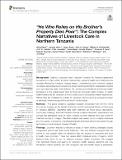Files in this item
“He who relies on his brother's property dies poor” : the complex narratives of livestock care in northern Tanzania
Item metadata
| dc.contributor.author | Davis, Alicia | |
| dc.contributor.author | Virhia, Jennika | |
| dc.contributor.author | Buza, Joram | |
| dc.contributor.author | Crump, John A. | |
| dc.contributor.author | de Glanville, William A. | |
| dc.contributor.author | Halliday, Jo E. B. | |
| dc.contributor.author | Lankester, Felix | |
| dc.contributor.author | Mappi, Tauta | |
| dc.contributor.author | Mnzava, Kunda | |
| dc.contributor.author | Swai, Emanuel S. | |
| dc.contributor.author | Thomas, Kate M. | |
| dc.contributor.author | Toima, Mamus | |
| dc.contributor.author | Cleaveland, Sarah | |
| dc.contributor.author | Mmbaga, Blandina T. | |
| dc.contributor.author | Sharp, Jo | |
| dc.date.accessioned | 2021-11-17T14:30:08Z | |
| dc.date.available | 2021-11-17T14:30:08Z | |
| dc.date.issued | 2021-11-03 | |
| dc.identifier | 276737592 | |
| dc.identifier | fe63184d-06af-4287-b862-4bd9cab60d58 | |
| dc.identifier | 85119424851 | |
| dc.identifier | 000721731600001 | |
| dc.identifier.citation | Davis , A , Virhia , J , Buza , J , Crump , J A , de Glanville , W A , Halliday , J E B , Lankester , F , Mappi , T , Mnzava , K , Swai , E S , Thomas , K M , Toima , M , Cleaveland , S , Mmbaga , B T & Sharp , J 2021 , ' “ He who relies on his brother's property dies poor ” : the complex narratives of livestock care in northern Tanzania ' , Frontiers in Veterinary Science , vol. 8 , 749561 . https://doi.org/10.3389/fvets.2021.749561 | en |
| dc.identifier.issn | 2297-1769 | |
| dc.identifier.other | Jisc: 742c9e9fe35e4610a1d3befcaa4cc78a | |
| dc.identifier.other | ORCID: /0000-0001-5805-4296/work/103511219 | |
| dc.identifier.uri | https://hdl.handle.net/10023/24351 | |
| dc.description | This study was supported by the Biotechnology and Biological Sciences Research Council, Department for International Development, the Economic and Social Research Council, the Medical Research Council, the Natural Environment Research Council and the Defence Science and Technology Laboratory funded this research under the Zoonoses and Emerging Livestock Systems (ZELS) programme (BB/L018926/1 and BB/L018845/1). | en |
| dc.description.abstract | Background: Endemic zoonoses have important impacts for livestock-dependent households in East Africa. In these communities, people's health and livelihoods are severely affected by livestock disease losses. Understanding how livestock keepers undertake remedial actions for livestock illness has the potential for widespread benefits such as improving health interventions. Yet, studies about livestock and human health behaviours in the global south tend to focus on individual health choices. In reality, health behaviours are complex, and not solely about individualised health experiences. Rather, they are mediated by a range of “upstream” factors (such as unequal provision of services), which are beyond the control of the individual. Methods: This paper presents qualitative research conducted from 2014 to 2019 for a study focused on the Social, Economic, and Environmental Drivers of Zoonoses in Tanzania (SEEDZ). Qualitative data were collected via focus group discussions, community meetings, informal interviews, formal in-depth interviews, observations and surveys that addressed issues of health, disease, zoonotic disease risks, and routes for treatment across 21 villages. Thematic analysis was carried out on in-depth interviews and focus group discussions. Conceptual analyses and observations were made through application of social science theories of health. Findings: Livestock keepers undertake a range of health seeking strategies loosely categorised around self and formal treatment. Two key themes emerged that are central to why people make the decisions they do: access to resources and trust in health care providers. These two issues affect individual sense of agency which impacts their ability to act to improve livestock health outcomes. We suggest that individual choice and agency in veterinary health seeking decisions are only beneficial if health systems can offer adequate care and health equity is addressed. Significance: This study demonstrates the value of in-depth qualitative research which reveals the nuance and complexity of people's decisions around livestock health. Most importantly, it explains why “better” knowledge does not always translate into “better” practise. The paper suggests that acknowledging and addressing these aspects of veterinary health seeking will lead to more effective provision. | |
| dc.format.extent | 18 | |
| dc.format.extent | 1095731 | |
| dc.language.iso | eng | |
| dc.relation.ispartof | Frontiers in Veterinary Science | en |
| dc.subject | Health seeking behaviours | en |
| dc.subject | One Health | en |
| dc.subject | Livestock health | en |
| dc.subject | KAP | en |
| dc.subject | East Africa | en |
| dc.subject | SF Animal culture | en |
| dc.subject | QH301 Biology | en |
| dc.subject | NDAS | en |
| dc.subject | SDG 3 - Good Health and Well-being | en |
| dc.subject.lcc | SF | en |
| dc.subject.lcc | QH301 | en |
| dc.title | “He who relies on his brother's property dies poor” : the complex narratives of livestock care in northern Tanzania | en |
| dc.type | Journal article | en |
| dc.contributor.institution | University of St Andrews. School of Geography & Sustainable Development | en |
| dc.contributor.institution | University of St Andrews. Geographies of Sustainability, Society, Inequalities and Possibilities | en |
| dc.identifier.doi | 10.3389/fvets.2021.749561 | |
| dc.description.status | Peer reviewed | en |
This item appears in the following Collection(s)
Items in the St Andrews Research Repository are protected by copyright, with all rights reserved, unless otherwise indicated.

